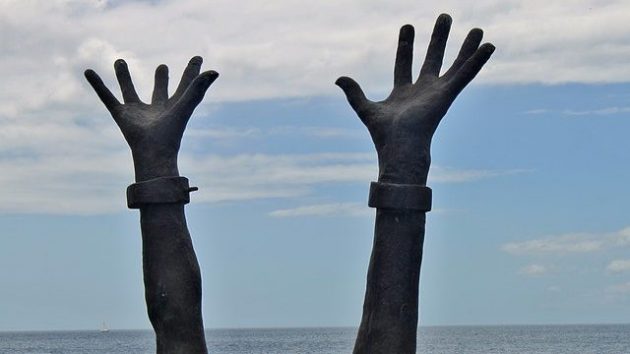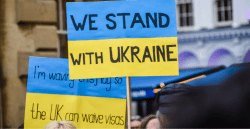January, trafficking prevention month, a month set aside as National Slavery and Human Trafficking Prevention Month. Read from the U.S. Department of State’s Office to Monitor and Combat Trafficking in Persons website fifteen ways all of us can join in the fight to stop human trafficking. Focus this January on helping to prevent trafficking.
1. Learn the indicators of human trafficking so you can help identify a potential trafficking victim. Human trafficking awareness training is available for individuals, businesses, first responders, law enforcement, educators, and federal employees, among others.
2. If you are in the United States and believe someone may be a victim of human trafficking, report your suspicions to law enforcement by calling 911 or the 24-hour National Human Trafficking Resource Center line at 1-888-373-7888. Trafficking victims, including undocumented individuals, are eligible for services and immigration assistance.
3. Be a conscientious and informed consumer. Discover your slavery footprint, ask who picked your tomatoes or made your clothes, or check out the Department of Labor’s List of Goods Produced by Child Labor or Forced Labor. Encourage companies to take steps to investigate and prevent human trafficking in their supply chains and publish the information for consumer awareness.
4. Volunteer and support anti-trafficking efforts in your community.
5. Meet with and/or write to your local, state, and federal government representatives to let them know you care about combating human trafficking, and ask what they are doing to address it.
6. Host an awareness event to watch and discuss films about human trafficking. For example, learn how modern slavery exists today; watch an investigative documentary about sex trafficking; or discover how human trafficking can affect global food supply chains. Also, check out CNN’s Freedom Project for more stories on the different forms of human trafficking around the world.
7. Organize a fundraiser and donate the proceeds to an anti-trafficking organization.
8. Encourage your local schools to partner with students and include modern slavery in their curricula. As a parent, educator, or school administrator, be aware of how traffickers target school-aged children.
9. Be well-informed. Set up a web alert to receive current human trafficking news. Become familiar with public awareness materials available from the Department of Health and Human Services or the Department of Homeland Security.
1o. Work with a local religious community or congregation to help stop trafficking by supporting a victim service provider or spreading awareness of human trafficking.
11. Businesses: Provide jobs, internships, skills training, and other opportunities to trafficking survivors.
12. Students: Take action on your campus. Join or establish a university club to raise awareness about human trafficking and initiate action throughout your local community. Consider doing one of your research papers on a topic concerning human trafficking. Request that human trafficking be included in university curricula.
13. Health Care Providers: Learn how to identify the indicators of human trafficking and assist victims. With assistance from anti-trafficking organizations, extend low-cost or free services to human trafficking victims.
14. Journalists: The media plays an enormous role in shaping perceptions and guiding the public conversation about human trafficking. Here are some media best practices on how to effectively and responsibly report stories on human trafficking.
15. Attorneys: Offer human trafficking victims legal services, including support for those seeking benefits or special visas. Resources are available for attorneys representing victims of human trafficking.







Freedom United is interested in hearing from our community and welcomes relevant, informed comments, advice, and insights that advance the conversation around our campaigns and advocacy. We value inclusivity and respect within our community. To be approved, your comments should be civil.